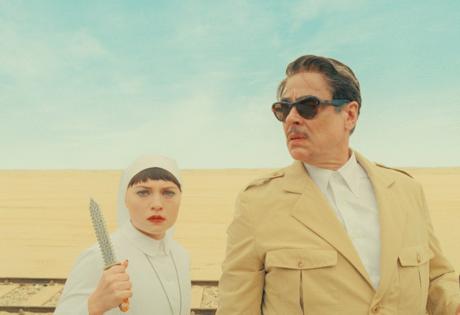Review: 'The Phoenician Scheme' is A New Helping of Wes Anderson's Deadpan Whimsy
Over the course of nearly 30 years, director Wes Anderson has built an avid following with his distinctive films, from the 1996 "Bottle Rocket" to the 2014 "Grand Budapest Hotel." Most of his movies, with their toybox sets and locked-down pictorial style, look like no others. In recent years, however, Anderson seems to have bogged down in his narrow obsessions, most recently in the parched and tiresome "Asteroid City" (2023) and now "The Phoenician Scheme," which doesn't repay the close attention that would be required to keep track of its underpowered plot.
As is usual with latter-day Anderson pictures, this one is filled with familiar faces, most of them briefly seen. Among the many Friends of Wes on hand are Scarlett Johansson, Tom Hanks, Jeffrey Wright, Bryan Cranston and Benedict Cumberbatch; Bill Murray, a longtime Anderson collaborator, makes a fleeting appearance as God.
The story, created by Anderson and Roman Coppola and scripted by Anderson, is set largely in an approximation of the Middle East, in what appears to be the 1950s. Some of the characters echo this period; one of them, played by the movie's star, Benicio Del Toro, is oddly nicknamed "Zsa-zsa," possibly after the late Hungarian actress Zsa Zsa Gabor; another, Prince Farouk (Riz Ahmed), seems derived from the repulsive Egyptian monarch King Farouk.
The movie is intricately designed, as usual (an overhead shot of Del Toro in a bathtub set on a floor of dazzlingly angled midcentury tiles is a classic Anderson eyeful), and the color palette is characteristically rich. But the movie's plot resists sustained interest. Del Toro's character, Anatole "Zsa-zsa" Korda, is a rapacious industrial mogul (armaments, aviation) who carries around a box of grenades to distribute as gifts to the people he meets. Korda is widely reviled wherever his name is known. He is a frequent target of revolutionary assassins and is rarely seen without a bruise or a bandage. (The movie gets off to an explosive start with yet another failed attempt on his life.) Korda has 10 children -- nine sons, who live largely ignored for the most part in a house across the street from his own palatial dwelling, and a daughter named Liesl (Mia Threapleton), who was dumped in a nunnery as a child and is now on the brink of taking the veil herself. For reasons unclear, Korda has decided to retrieve Liesl and make her the sole heir to his vast fortune. Why?
"I have my reasons," Korda tells her.
"Which are what?" Liesl asks.
"I'm not saying," Kora responds. "I'm saying I'm not saying."
Not everyone is fond of this sort of clotted dialogue, and some might find their attention beginning to drift after the addition of another character, a Norwegian entomologist named Bjorn (Michael Cera with an irritating accent). Then the narrative moves along to the sandy wastes of Arabia, where Korda is determined to establish a capitalist beachhead of some sort in the ancient land of Phoenicia, which he's already littered with the names of various sizes of wine bottles (Valley of Nebuchadnezzar, Foothills of Jeroboam, and so forth). All of this is very whimsical -- very Wes, in other words -- as is an out-of-nowhere basketball interlude in which Anderson suddenly allows his characters time to shoot some hoops. Don't ask why, I guess.
Back in the modern world, Korda's enemies are scheming to derail his plans and we drop in on them doing so a couple of times. But it's hard to care what they're up to, because there's virtually nothing at stake in the story: no love action, no nail-biting intrigue. The movie has the somnolent feel of an exercise, a flexing of style. Even Anderson's most devoted fans may be ready for something a bit more at this point.
========
To find out more about Kurt Loder and read features by other Creators writers and cartoonists, visit the Creators website at www.creators.com.
Copyright 2025 Creators Syndicate, Inc.
















Comments